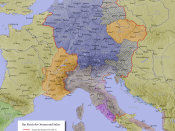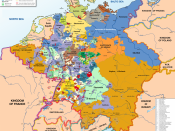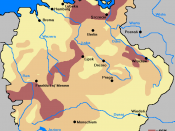Nationalism, or the love of one's country, has been the central theme in the sustained unification of most successful countries. Throughout German history, several unification attempts were not associated with a strong and sustained sense of nationalism. The Germanic peoples came together under strong leadership to achieve common goals and needs, including increased political, economic and military strength. The lack of sustained nationalism during these unification attempts destabilized Germany and created conflict. During the First Reich, or Holy Roman Empire, the people came together for defensive and political reasons, but there was no sustained nationalism. It was for this reason that there were border conflicts, ruling families kept changing, and there was religious conflict (The Story of Civilization IV). However, in the Second Reich, Otto von Bismarck created the first German unification with strong nationalistic feelings. These nationalistic feelings were not sustained after the wars for unification. Then, in the Third Reich, Adolf Hitler took nationalism to the extreme by trying to create one unified nation with only one race, persecuting everyone who was different.
Even though this extreme form of ethnic nationalism caused people to do horrible things, it created an extremely powerful and unified country (Pendulum Swings to Right in Reich). Today, Germany is a country with strong nationalistic feelings as demonstrated by the unification of East and West Germany in 1990. Nationalism, or the lack of it in some cases, has shown to be an important making or breaking factor in German unifications throughout history.
The Holy Roman Empire is said to have began in the year 800 with Emperor Charlemagne. This empire was about 300 small German states unified to make one empire under one leader (The Holy Roman Empire). However, there was little nationalism between the states. Each state was autocratic, or...


